Other than robot unicorns, mugs of tea (earl grey, hot), and pictures of Tom Hiddleston, the sight most prevalent in our little rocket here at Tor.com are heaps of heaps of books! We get books any way we can here, and though we’re primarily a science fiction and fantasy website, we read across a myriad of genres.
Between our rereads and regular columns including Under the Radar, Fiction Affliction, Short Fiction Spotlight, Sleeps with Monsters, and Genre in the Mainstream, we’re reading books and reviewing books around the clock! So with 2013 coming to a close, we invited our regular contributors to choose their three favorite books from the last year, and we’re sharing their responses and recommendations below.
Please enjoy this eclectic overview of some of our favorite books from 2013, and be sure to let us know about your own favorites in the comments!
 Jenn Northington
Jenn Northington
It’s never easy to pick the best books out of a whole year’s worth of reading, but these three standouts from 2013 have had me chasing people around the aisles of the bookstore.
There are a lot of things to love about Karen Russell’s recent short story collection, Vampires in the Lemon Grove, but my favorite is the verbal secret handshake that occurs when two people who have read it compare notes. “And the one with the mirror?! Oh my god.”
I haven’t been able to stop talking about Ken Kalfus’s Equilateral, which is the most bonkers historical fiction about the hunt for extraterrestrial life I have ever had the pleasure to read. I mean, what 19th century astronomer wouldn’t build a giant equilateral triangle in the Sahara Desert in order to contact the Martians, am I right?
And as I keep insisting to anyone who will listen, Dara Horn is the China Mieville of literary fiction and her newest book, A Guide for the Perplexed, proves it. It’s a philosophical treatise, cyberthriller, family story, kidnapping, and quest for the Information Age’s Holy Grail—universal archiving—all in one.
 Amal El-Mohtar
Amal El-Mohtar
The three stand-out knock-me-down-and-build-me-up books I read this year were Sofia Samatar’s A Stranger in Olondria, Elizabeth Wein’s Code Name Verity, and Nicola Griffith’s Hild. They’re all very different from each other—one is a secondary world fantasy, one is historical YA set during the second World War, and one is about the life and times of the woman who would become St Hilda—but they share a core of women telling their own stories, magnificent (and wildly divergent) prose, and striking characters supported by a wealth of loving research. They also make for an interesting triptych of relationships between oral and written histories.
A Stranger in Olondria awed me mostly with its rich descriptive style, such that I remember it chiefly as an experience of light, scent, and taste; Code Name Verity’s brilliant structure and pacing left me an inconsolably shattered husk of a human being convinced that nothing could be good and beautiful ever again if it were not this book; and Hild’s thousand felicities I still can’t stop exclaiming about, so it’s a good thing I reviewed it more fully for NPR.
I can’t recommend these books enough.
 Niall Alexander
Niall Alexander
In the course of curating the British Genre Fiction Focus and its forward-facing sister, the Hitlist, I’ve had the perfect pretext to pay particular attention to the best British books released this year. This, then, strikes me as an outstanding opportunity to highlight a few of the finest.
The first to wholly floor me was but one of 2013’s two terrific Patrick Ness novels. An intensely affecting love story bolstered by a remarkable cast of characters, “I laughed at The Crane Wife, and I cried… but before it was over, I also felt like I’d lived another life, and died a little inside.”
Though The Crane Wife has its tragedies, The Machine by James Smythe is a far bleaker beast. It’s a brilliant book about woman who decides to reprogram her haunted husband using an obscene machine which purports to restore the essence of a person’s self. “Precise and provocative, The Machine is a powerful parable about memory and regret which grips from the get-go.”
Last but not least, The Year of the Ladybird is “slight but delightful ghost story” by Graham Joyce set in a budget British holiday resort during the infamous summer of ’76. It’s the author’s best book in years, and what sets it apart is “Joyce’s ability to engineer—not behind the scenes but in plain sight—a feeling that something magical is happening, something extraordinary, even when there’s little more to the story than immediately meets the eye.” This is British genre fiction at its best.
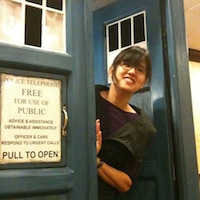 Karin L. Kross
Karin L. Kross
Unnatural Creatures, edited by Neil Gaiman and Maria Dahvana Headley, was a completely delightful anthology, one that I’m certain to dip back into often in the future (particularly when I feel like I need to break my heart again on Peter S. Beagle’s “Come Lady Death”).
Max Gladstone’s Craft sequence continues to be terrific in the latest installment Two Serpents Rise; I love his refreshingly diverse casts of characters, and the combination of corporate/legal thriller and fantasy in these books is totally irresistible.
And I also really enjoyed Joyce Carol Oates’s The Accursed, which improbably and dazzlingly weaves minutely researched historical fiction, Gothic horror, and tales of demon bridegrooms into a family epic that is also about the American original sin of racial oppression.
Honorable mention: J.M. Sidorova’s The Age of Ice—a sweeping drama of Russian history through a unique fantasy lens.
Rob Bedford
2013 brought many great books to readers and the tough task is whittling it down to three books. That said, the top slot is easy for me, Joe Hill’s NOS4A2 was my favorite book of the year. NOS4A2 is a dark fantasy/epic horror novel about survival, love, sacrifice, and modern-day vampires. In short, it is a novel by a writer at the height of his talents. Protagonist Vic is a young girl, a lost soul, who becomes entangled in the life of Charles Talent Manx, who lures children to Christmasland, aided by Bing, AKA the Gasmask Man. Manx has much in common with vampires; despite not having the requisite fangs he most definitely saps the life of children, but Christmasland has nothing in common with Jolly Old Saint Nick’s North Pole abode. Hill balances the intimacy of superb characters against the epic backdrop in which he’s set his story.
Determining the next two books for this top three is tough, but I’ll lean towards The Tyrant’s Law by Daniel Abraham. This third book in his Dagger and the Coin sequence is a superb addition to what, for me, is the best ongoing Epic Fantasy series being written. This installment follows the same rotating POV structure as the previous two novels, and continues the tale of a world readjusting to a major change while beset by the slow reemergence of powers and creatures long-thought to be dead or mythical. Abraham writes some of the best characters and some of the most empowered women in the genre.
Finally, a writer who made my top 3 in 2012 makes the cut again in 2013—Robert Jackson Bennett. American Elsewhere was a fantastic novel that is a blend of Mystery, Science Fiction, Dark Fantasy, and Lovecraftian / Cthulhu Mythos that brings those elements together in an unsettling fusion of a powerful whole that is like the best amalgamation of a Neil Gaiman and Stephen King novel. A woman’s father dies and she learns of his house she inherited in the so-remote-it-is-barely-on-any-maps town of Wink, New Mexico. When she arrives in Night Vale … rather Wink, she learns why this little town is not on any map and why it is so secretive.
Honorable mentions go to Rachel Bach’s Fortune’s Pawn, Myke Cole’s Fortress Frontier. James K. Decker’s The Burn Zone, V.E. Schwab’s Vicious, and Chuck Wendig’s The Blue Blazes.
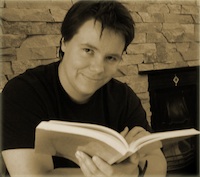 Liz Bourke
Liz Bourke
It’s been something of a bumper year for excellent books—at least for me. The really unexpected standout was Ann Leckie’s Ancillary Justice, an utterly amazing debut about which plenty of ink has already been spilled. I really hope we see more science fiction with this much ambition for its cultures, societies, characters, and storytelling in the future: it’d be great if Leckie could start a trend.
But I’m torn to pick my favourites of the rest of this year’s crop without drifting off into a list. There’s Nicola Griffith’s brilliant Hild, of course, and Elizabeth Bear’s excellent Shattered Pillars, and Roz Kaveney’s quirkily wonderful Reflections, and Aliette de Bodard’s On A Red Station, Drifting, and Marie Brennan’s A Natural History of Dragons, and Stephanie Saulter’s Gemsigns—see, a list. I told you. And I’m leaving out others, just as close to my heart. Books! Don’t make me choose between them…
 Stefan Raets
Stefan Raets
The best books I read in 2013 were published in 2012 (Range of Ghosts by Elizabeth Bear) and 2011 (City of Bohane by Kevin Barry) respectively, but my Top 3 books that were actually published in 2013 are:
Six-Gun Snow White by Catherynne M. Valente: This stunning novella recasts Snow White as a biracial girl in a memorable Wild West setting, creating an intricately layered, moving and unforgettable story.
Hild by Nicola Griffith. Historical fiction, set in Seventh Century England, about the early life of the young, unique woman who would become St. Hilda of Whitby. Don’t usually read historical fiction? Read it anyway. Hell, read it if you don’t usually read books.
Ancillary Justice by Ann Leckie. This stunning space opera introduces Breq, the woman who used to be a spaceship and who is now on a mission to kill the immortal, multi-bodied leader of the Radchaai Empire she used to serve. Easily the SF debut of the year, Ancillary Justice challenges expectations on more than a few levels.
Sneaking in one more: my favorite short story collection of 2013 was Conservation of Shadows by Yoon Ha Lee.
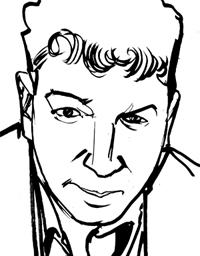 Ron Hogan
Ron Hogan
Back in the summer, I read Nelly Reifler’s Elect H. Mouse State Judge for Tor.com’s “Genre in the Mainstream,” and it’s still one of my favorite books this year in that hazy zone where “literary fiction” and “SF/fantasy” overlap. As I said then, the short novel “unfolds perhaps not so much like a dream, but like a perverse playdate with the contents of a 1970s toy box dumped onto the floor,” with Ken and Barbie transformed into hypersexualized private investigators and the Sunshine Family dolls recast as a sinister cult—but it’s the psychological underpinnings Reifler brings to the story that make it truly unsettling.
I was also unnerved by Nathaniel Rich’s Odds Against Tomorrow, which I wrote about for the Dallas Morning News. You can imagine what reading a novel about a mega-hurricane slamming into New York City just a few months after living through Sandy was like. But the real heart of Rich’s story is Mitchell Zukor, a worst-case scenario planner for a darkly satirical consulting firm. As his boss explains it: “We make recommendations to our clients about how to reduce their exposure to catastrophe… If our recommendations are insufficient, we’re not liable. And our clients, as long as they pay for our services, are not liable either.” Fans of Fred Pohl and C.M. Kornbluth’s The Space Merchants would feel right at home in Rich’s world.
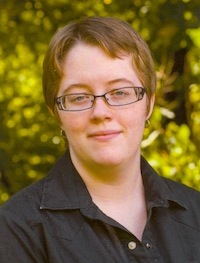 Lee Mandelo
Lee Mandelo
For me, 2013 stood out for its collections—in particular, the two-volume Ursula K. Le Guin retrospective The Unreal and the Real and Christopher Barzak’s Before and Afterlives. The Le Guin retrospective has been a long time coming, and the arrangement of the volumes into “realist” and “speculative” is also intriguing and perhaps more slippery than it at first appears. Barzak’s first collection of short fiction showcases a range of clever, touching, and personal pieces—it’s handsome and pleasant to read.
Otherwise, I’d also like to mention one novel and one nonfiction book of note: Blood Oranges by Kathleen Tierney (Caitlin R. Kiernan) and Scatter, Adapt, Remember: How Humans Will Survive a Mass Extinction by Annalee Newitz. Blood Oranges is a satirical romp, insanely fun and sharp-tongued, where Kiernan has a go at the tropes of “urban fantasy” and comes through with a delightful pastiche. In a different vein, Scatter, Adapt, Remember takes a potentially dark and pessimistic topic—mass extinctions—and takes it in an educationally uplifting direction, exploring the past to survive the future. It’s readable as hell, too—one of the most approachable and entertaining nonfiction books I’ve read in a while.
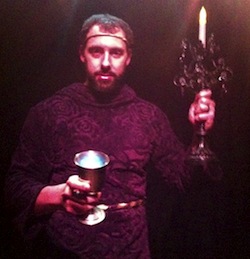 Mordicai Knode
Mordicai Knode
For me, it a was a year of mummies, vampires and…brave warrior mice!
Mouse Guard: the Black Axe, written & illustrated by David Petersen, is my number one pick for 2013; a Mouse Guard prequel about the struggle of one mouse to become the aged mythic hero of the latter series. A book I was forced to describe as melting my face off it was so good.
Then there is Gene Wolfe’s The Land Across, which in Wolfe’s usual deceptive fashion is about several radically divergent concepts; authority, travel writing and…Dracula? One of Wolfe’s more “urban fantasy” novels; like Peace or The Sorcerer’s House.
It wouldn’t be a good end of the year round-up for me if it didn’t have a roleplaying book on it, and my favorite this year was Mummy: the Curse for the World of Darkness. What do you want from a mummy book? Swarms of chittering scarabs? Sentient sandstorms? Evolution from a shambling horror to a sleek sorcerer? Okay, I’m just listing stuff that happened in the movie The Mummy but that is ultimately my point: I wanted cool mummy stuff & I got cool mummy stuff.
 Alex Brown
Alex Brown
Best book of 2013? You realize you’re asking me to choose between The Ocean at the End of the Lane by Neil Gaiman, NOS4A2 by Joe Hill, and Something More Than Night by Ian Tregillis. A choice like that is impossible. It’s like asking which sucks more: awesome, mind-blowing, or fan-frakking-tastic. These are the 3 authors that break me apart over and over again. I have travelled great distances to see them read and faked sick at work to stay in bed to read them. I own multiple copies of everything they’ve ever written (even the infamous Duran Duran bio), yet rarely have copies on my bookshelves because they’re always on loan to friends and family. Their stories are heartbreaking, tragic, comic, disturbing, disconcerting, and lovely all at the same time, and populated by characters that are the antithesis of a trope. But it’s the way they write that gets me the most. There’s an undercurrent of a melody to their literature, a lyrical poetry, a way of reworking English into something wholly new that I relish. Pick any of these 3 books as your Next Great Read and you won’t be disappointed.
 Justin Landon
Justin Landon
2013 is kind of a wacky year for me, in that picking the year’s best titles is simple. Robert Jackson Bennett’s fourth novel, American Elsewhere, is one of those quintessential commentaries on Americana that’s so pervasive in contemporary lit, but he bedazzles that narrative style with a creeping primordial Lovecraftian horror. What Lavie Tidhar did in The Violent Century is somewhat similar, capturing a literary structure and style and pairing it with a subject matter more at home in the pulps—World War II superheroes. It’s a beautiful novel that’s as much a romance as it is a thriller. And finally, Ancillary Justice by Ann Leckie is the right novel at the right time for genre readers. It’s an accessible and exciting space opera that also challenges all kinds of reader preconceptions about gender and the expectations we assign to that designation in our culture. If someone was only going to read three science fiction and fantasy novels this year, these three are the right answer. Get shopping!










